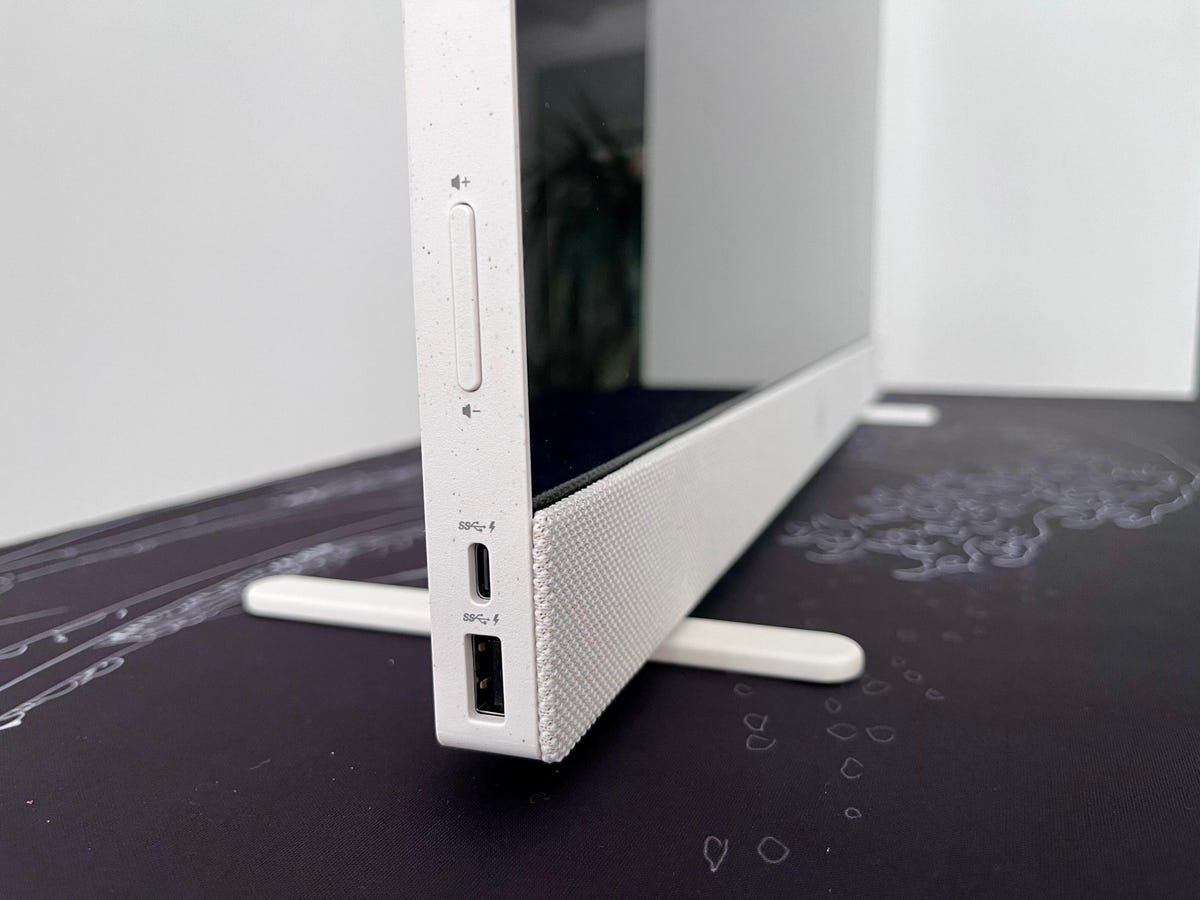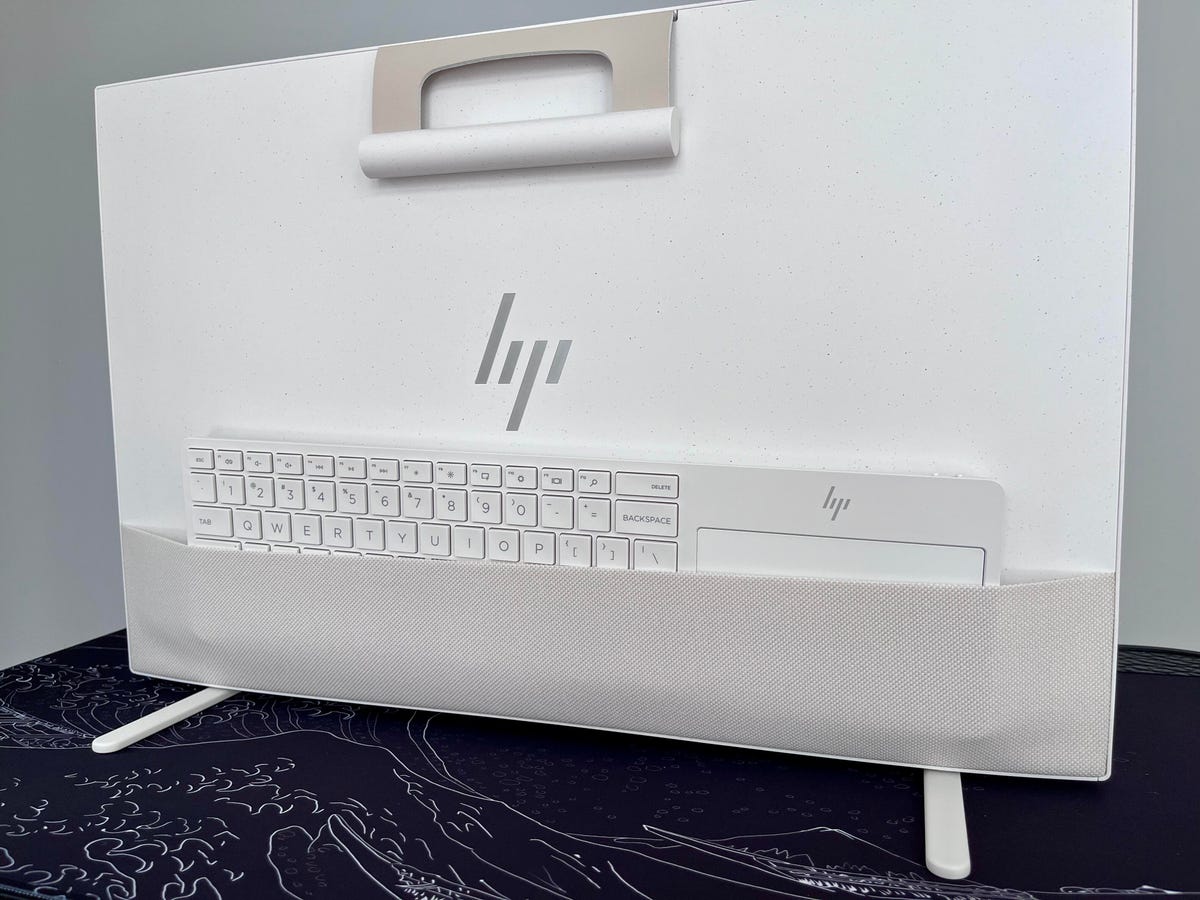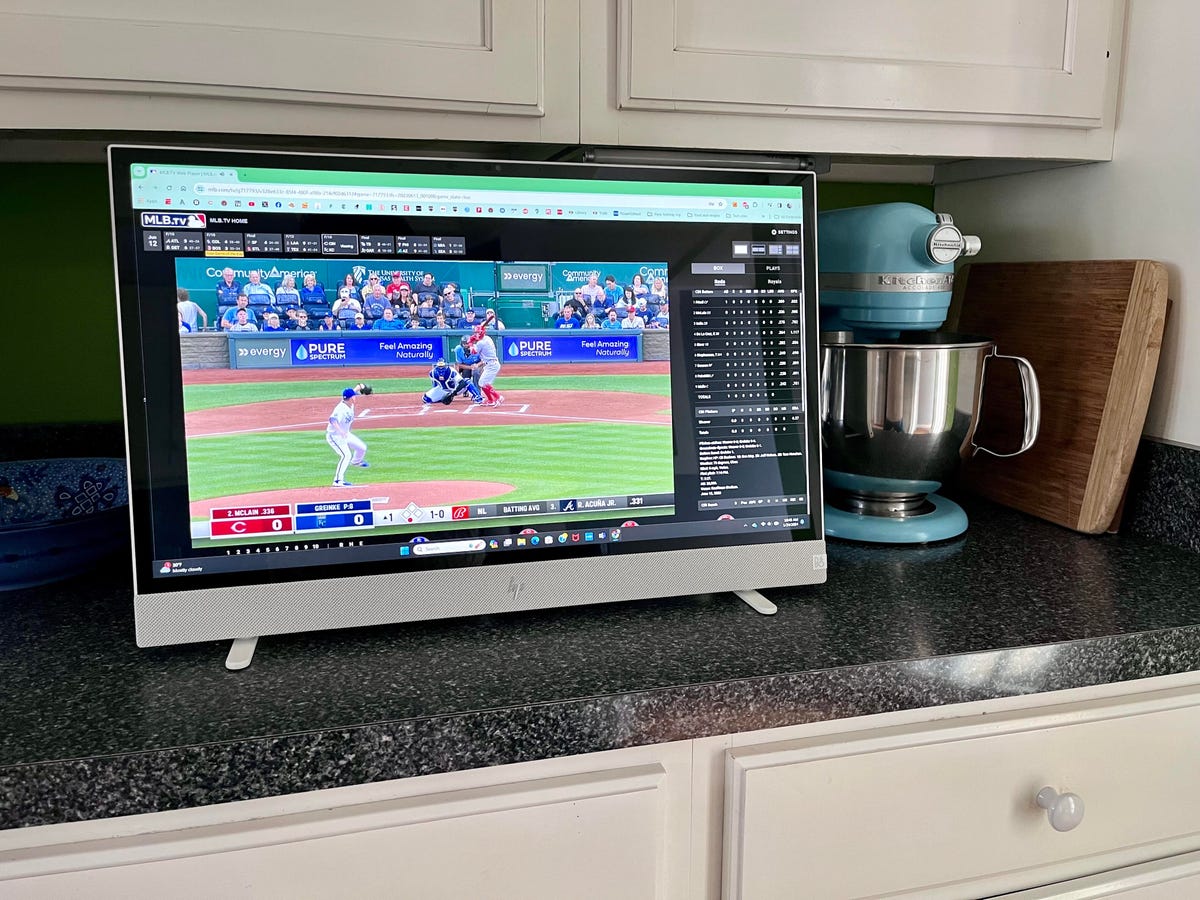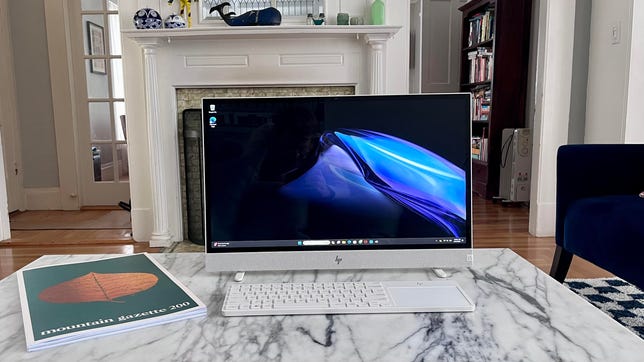 Why You Can Trust CNET
Why You Can Trust CNET

Pros
- Battery, handle and flip-out feet make it easy to tote from room to room
- Bright, crisp touch display
- High-res 1,440-pixel webcam
Cons
- Display has no height and very little tilt adjustment
- Audio output is underwhelming
- No headphone jack
HP isn’t afraid to experiment with PC designs, as evidenced most recently by the HP Spectre Foldable PC, which can operate as a small 17-inch desktop PC, a large 17-inch tablet, or a compact 12.3-inch laptop. There’s also the HP Chromebase AiO 22, which follows a traditional all-in-one setup but runs on Google’s ChromeOS instead of Microsoft Windows — it offers a display that can swivel between landscape and portrait while connected to its cone-shaped base, which doubles as a speaker. And then there’s the HP Envy 34 All-in-One, which with its 34-inch, ultrawide 21:9 display is one of the few big-screen all-in-ones remaining.
The HP Envy Move All-in-One 24 is another of the company’s efforts to break from the ordinary. At first glance, it may look like a straightforward 24-inch all-in-one PC, but the handle and pouch on the back panel are the first clues that this unassuming all-in-one is different. That handle and pouch are there to help you tote the system and its keyboard from room to room. It doesn’t stop there, though: The Envy Move has a built-in battery, letting it be used for hours away from a wall outlet. I love the design — particularly the clever feet that disappear from view when you pick it up and suddenly reappear when you place it back down — but the Envy Move is a better fit as an entertainment device for surfing the web and streaming shows and movies than a productivity machine for getting work done.
HP Envy Move All-in-One 24
| Price as reviewed | $1,100 |
|---|---|
| Display size/resolution | 23.8-inch 2,560×1,440-pixel IPS touch display |
| CPU | 1.7GHz Intel Core i7-1355U |
| Memory | 16GB LPDDR5 6,400MHz |
| Graphics | 128MB integrated Intel Iris Xe graphics |
| Storage | 512GB SSD |
| Networking | Realtek RTL8852BE Wi-Fi 6 (2×2), Bluetooth 5.3 |
| Operating system | Microsoft Windows 11 Home |
The Envy Move is based on a 23.8-inch touch display with a QHD (2,560×1,440 pixel) resolution powered by 13th-gen Core mobile processors from Intel’s efficient U series. The baseline model costs $900 and features a Core i3-1315U, 8GB of RAM and a 256GB SSD. If you’re buying the Envy Move primarily to watch Netflix and YouTube and otherwise surf the web, the baseline model will provide more than enough muscle. Our system features a Core i5-1335U, 16GB of RAM and a 512GB SSD for $1,100 and it’s the better choice if it’ll be pulling double duty as a home office computer and portable entertainment device.
The Core i5-based model with a 1TB SSD is available for 1,399 in the UK, and a Core i5-based model with a 512GB SSD is available for AU$1,999 in Australia.

Battery powered
In testing, the Envy Move produced results that were on par with those of midrange, Core i5-based laptops. It offers sufficient application performance but meager 3D graphics capabilities. Creators and gamers will want at least a Core i7 CPU and dedicated graphics or a new Core Ultra CPU and its integrated Arc graphics, which are an improvement over the integrated Iris Xe GPU of the Envy Move.
HP says the Envy Move will run for 4 hours on its six-cell, 83-watt-hour battery, and our test system bore that out, lasting 4 hours and 8 minutes during our online streaming battery-drain test. That figure may pale in comparison to a typical laptop’s runtime, but the Envy Move has to power a much larger display than the typical laptop. And it’s a fairly high-res QHD display at that. The larger the display and the more pixels it has, the more taxing it is on the battery. As it is, the Envy Move will let you get through even the longest of movies, including the 3-hour Oppenheimer or even the 3-hour-and-26-minute Killers of the Flower Moon, on a single charge. Four hours of runtime also sets you up to binge-watch roughly half a season of a show.
Feet to flip for
The most interesting part of the Envy Move’s design isn’t the inclusion of a battery; it’s the two small feet the machine rests on. They automatically spin into position when you place the system down, and they spin back to line up with the bottom of the system and stay out of the way when you pick the computer up. Without these magic little feet that materialize when you need them and disappear when you don’t, the Envy Move wouldn’t be nearly as portable and versatile. Because who wants to lug an all-in-one around the house if it has a heavy, awkward anchor of a base or is inconvenient to set up?
After my initial delight in discovering the flip-out and hide-away feet, I began to worry that they were a bit too streamlined to create a sturdy base for the 24-inch display. My fears were assuaged when I saw that the feet are longer behind the display than they are in front. The feet create enough of a platform that it would take a concerted effort to tip the system over. Additionally, both feet are metal, making them much less likely to snap than if they were plastic.

The feet and the rest of the system are a soft white color, lending the Envy Move the look of a consumer device rather than a Windows PC. The display is framed by a narrow, white border, but its bezels are a bit wider than those found on most laptops. The system weighs 8.4 pounds and is easy to tote from one room to another thanks to its handle, but there’s still room to shave off some weight and size from the design.
Like the two feet on the bottom, the Envy Move’s handle remains out of sight when it isn’t needed. It rests against the back panel and attaches gently via magnets to remain in place. A fabric pouch runs the width of the back panel along the bottom. Its purpose is to let you stash the keyboard to take it with you when you up and move the Envy Move. The keyboard has an integrated touchpad so you don’t need to worry about juggling a mouse when moving room to room.

You don’t necessarily need a mouse or the keyboard’s touchpad to navigate Windows, since the Envy Move’s display has touch support. The display is bright and crisp for both work and entertainment. I like getting a QHD resolution, because text is much sharper than it would look on a 24-inch, 1080p display. Given the reasonable starting price, I figured HP would outfit the system with a basic, 250-nit panel, and I was pleasantly surprised to find that it measured 314 nits of peak brightness on my tests using a Spyder X Elite colorimeter.
Despite the crispness of text, I still wouldn’t want to use the Envy Move as my primary work computer because of its lack of height, and little tilt, adjustment. Without being able to raise the display, I wanted to push it back farther than the very narrow amount of tilt adjustment allows. It rested a bit too vertically for me when I sat in front of it at a desk.

The included keyboard also lacks feet along the bottom of its back edge that would allow you to tilt it to a more comfortable typing position. It lies flat and is better suited to entering URLs and typing out quick emails than to longer writing sessions.
Like the display, the webcam offers a higher resolution than I expected. The 5-megapixel webcam can capture 1440p video, which results in a finer, more balanced picture than you get with a 1080p camera. It also features a physical privacy shutter so you can rest assured no one is using the webcam to spy on you.
A fabric-covered speaker grill sits below the display and mimics the look of the fabric pouch on the back, resulting in a clean, unified look. The fabric speaker grill may look sharp, but the sound of the two 5-watt speakers beneath it disappoints. Audio can easily fill a small room, but it quickly loses fidelity when you reach roughly 70% volume. And at any volume level, there’s a distinct lack of bass response. It’s too bad HP didn’t outfit the Envy Move with quad speakers for fuller sound.
Ports are limited: You get a single USB-C port and a USB-A port on the left, and an HDMI-in and power input on the right. Missing is a headphone jack, so you’ll need a Bluetooth speaker or Bluetooth headphones if you want to avoid the uninspiring built-in speakers.
In addition to the ports on the sides, the Envy Move supplies a couple of useful buttons that’ll help when the keyboard is stowed away. There’s a volume rocker on the left and a rocker to control display brightness on the right. Also on the right is a video-source button that lets you toggle between Windows and whatever you have plugged into the HDMI port — an Xbox or another console, for example.
Versatile secondary computer

I see a very plausible use case scenario for the Envy Move in my own home. I like to watch baseball in the summer months, and I usually stream Cincinnati Reds games on my iPad as I move throughout my evening — while cooking in the kitchen with the iPad on the counter, enjoying a beer on the patio with the iPad on a table, and lying on the couch with the iPad in my lap as my wife watches a show on the TV. The Envy Move is too large to watch as a second screen in the family room or resting on my lap while lying in repose, but it gives me a larger screen than an iPad in the kitchen or on the patio to follow the Reds.
I could also see my kids using it to watch Netflix when we can’t all agree on what to watch in the evening. With the battery, they could take it to their room where they’d otherwise be staring at their phones or watching a show on a smaller laptop.
With the start of a new baseball season a few months away, I have some time to think about upgrading my secondary streaming screen. Like most convertible products, the Envy Move All-in-One 24 forces you to make sacrifices to get two products in one.
With more adjustment for better positioning of the screen, it would make a better work PC. And with a slightly smaller and lighter enclosure and better speakers, it would make a better entertainment device. None of these shortcomings are deal-breakers, however, and the Envy Move’s clever design and sharp QHD display make it more than serviceable for work and play. And it’s easy to transition between the two, because you simply need to close your work apps, unplug the computer and grab its handle to leave your home office and plop down in another room to watch a show or movie or game.
Geekbench 6 (multicore)
Cinebench R23 (multicore)
3DMark Wild Life Extreme Unlimited
PCMark 10 Pro Edition
Online streaming battery drain test
System Configurations
| HP Envy Move All-in-One 24 | Microsoft Windows 11 Home; Intel Core i7-1355U; 16GB DDR5 RAM; Intel Iris Xe graphics; 512GB SSD |
|---|---|
| HP Spectre x360 14 | Microsoft Windows 11 Pro; Intel Core Ultra 7 155H; 32GB DDR5 RAM; Intel Arc graphics; 2TB SSD |
| MSI Modern 14 C13M | Microsoft Windows 11 Home; Intel Core i5-1335U; 16GB DDR4 RAM; Intel Iris Xe Graphics; 512GB SSD |
| LenovoYoga 7i | Microsoft Windows 11 Home; Intel Core i5-1355U; 16GB DDR5 RAM; Intel Iris Xe graphics; 512GB SSD |
| LG Gram Style 16 | Microsoft Windows 11 Home; Intel Core i7-1360P; 32GB DDR5 RAM; Intel Iris Xe graphics; 1TB SSD |
| HP Spectre Foldable PC | Microsoft Windows 11 Pro; Intel Core i7-1250U, 16GB DDR5 RAM; Intel Iris Xe graphics; 1TB SSD |




